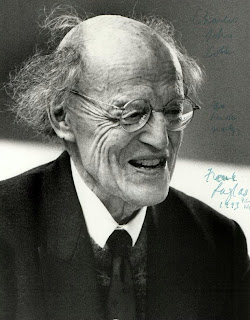Francis Aungier Pakenham, 7th Earl of Longford, was a British politician, author, social reformer and Catholic convert. The second son of Thomas Pakenham, 5th Earl of Longford, he was educated at Eton and Oxford. At Oxford he met his future wife, Elizabeth Harman, who persuaded him to convert from Conservative Party to Socialism. In 1940, after a period of religious unease, he converted to Roman Catholicism. His wife was initially dismayed by this, as she had been brought up as a Unitarian and associated Catholicism with reactionary politics; however, she herself converted to Catholicism in 1946. Their children were all raised Catholic.
Pakenham embarked on a political career. In 1945, he was created Baron Pakenham, of Cowley in the City of Oxford, and took his seat in the House of Lords. He served as a junior minister in the Labour governments of 1945–1951 and as a Cabinet member from 1964 to 1968. In 1961, he inherited from his brother the earldom of Longford in the Peerage of Ireland and from then onwards was generally known to the public as Lord Longford. He was created a Knight of the Garter in 1971.
Pakenham embarked on a political career. In 1945, he was created Baron Pakenham, of Cowley in the City of Oxford, and took his seat in the House of Lords. He served as a junior minister in the Labour governments of 1945–1951 and as a Cabinet member from 1964 to 1968. In 1961, he inherited from his brother the earldom of Longford in the Peerage of Ireland and from then onwards was generally known to the public as Lord Longford. He was created a Knight of the Garter in 1971.
Longford was a founding member of New Bridge, an organisation founded in 1956, which aims to help prisoners stay in touch with society and integrate back into it. He was a leading figure in the Nationwide Festival of Light of 1971, protesting against the commercial exploitation of sex and violence in Britain, and advocating the teaching of Christ as the key to recovering moral stability in the nation. His anti-pornography campaigning made him the subject of derision as Lord Porn when he and former prison doctor Christine Temple-Saville set out on a wide-ranging tour of sex industry establishments in the early 1970s to compile a self-funded report. The press made much of his visits to strip clubs in Copenhagen at the time.
Over time he gained a reputation for eccentricity, becoming known for his efforts to rehabilitate offenders and in particular campaigning for the parole and release from prison of the Moors murderer Myra Hindley, which led to the soubriquet Lord Wrongford from the tabloid press, who also nicknamed him “Lord Porn” after he toured Europe’s sex clubs that he had attempted to close down. It also coincided with Longford’s contact with Hindley becoming public knowledge in 1972, and allegations of hypocrisy were frequently made against him. In 1977, Longford appeared on television and spoke openly of his belief that Hindley should now be released from prison as she had repented for her sins and was no longer a danger to the public. In 1985, he condemned the Parole Board’s decision not to consider Hindley’s release for another five years as “barbaric”, and his campaign for Hindley continued even after she admitted to two more murders in 1986.
Known for his interest in Irish history he wrote a number of books on the topic. Lord Longford died in August 2001 at the age of 95. He and his wife, who died in October 2002 at the age of 96, had eight children, among them the writers Antonia Fraser, Rachel Billington, Judith Kazantzis, and Thomas Pakenham. His wife Elizabeth was a noted writer herself, her most famous book being Victoria R.I. (1964), a biography of Queen Victoria, published in the US as Born to Succeed. She also wrote a two-volume biography of the Duke of Wellington, and a volume of memoirs, The Pebbled Shore. She stood for Parliament as Labour candidate for Cheltenham in the 1950 general election. (Check out the 2006 movie Longford starring Jim Broadbent.)












